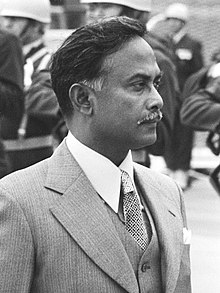Ziaur Rahman
| Ziaur Rahman | |
|---|---|

Ziaur Rahman in 1979 in the Netherlands
|
|
| 7th President of Bangladesh | |
|
In office 21 April 1977 – 30 May 1981 |
|
| Prime Minister |
Mashiur Rahman (Acting) Shah Azizur Rahman |
| Preceded by | Abu Sadat Mohammad Sayem |
| Succeeded by | Abdus Sattar |
| Chief of Army Staff | |
|
In office 24 August 1975 – 3 November 1975 |
|
| Preceded by | K M Shafiullah |
| Succeeded by | Khaled Mosharraf |
|
In office 7 November 1975 – December 1978 |
|
| Preceded by | Khaled Mosharraf |
| Succeeded by | Hussain Muhammad Ershad |
| Personal details | |
| Born |
19 January 1936 Bagbari, Bengal Presidency, British India (now Bogra, Bangladesh) |
| Died | 30 May 1981 (aged 45) Chittagong, Bangladesh |
| Nationality | Indian (1936-1947) Pakistani (1947-1971) Bangladeshi (1971-1981) |
| Political party | Bangladesh Nationalist Party |
| Spouse(s) | Khaleda Zia |
| Children |
Tarique Rahman Arafat Rahman |
| Alma mater |
D. J. Science College Pakistan Military Academy Command and Staff College |
| Profession | Military officer, Statesmen |
| Awards |
Bir Uttom Hilal-i-Jur'at Order of the Nile Hero of the Republic Order of the Yugoslav Star |
| Military service | |
| Allegiance |
|
| Service/branch |
|
| Years of service | 1953–1971 (Pakistan) 1971–1978 (Bangladesh) |
| Rank |
|
| Commands | |
Ziaur Rahman (Bengali: জিয়াউর রহমান Ji-yaur Rôhman; 19 January 1936 – 30 May 1981) was a Bangladeshi politician and army general who declared the Independence of Bangladesh on behalf of its first interim head of state Sheikh Mujibur Rahman. He later served as the 7th President of Bangladesh from 21 April 1977 until his assassination on 30 May 1981.
Zia as a Sector Commander of BDF Sector 1 initially, and immediately after of BDF Sector 11 of the Bangladesh Forces and the Brigade Commander of Z Force during the country's Independence war from Pakistan in 1971. He broadcast the Bangladeshi declaration of independence first on 26 March 1971 and again on 27 March on behalf of Sheikh Mujibur Rahman in a second broadcast. After the war, Zia became a brigade commander, later the deputy chief of the Bangladesh Army, due to his status as a war hero. He rose to power after a series of events resulted in Zia gaining de facto power as head of the government already under martial law imposed by the Mushtaq government. He took over the presidency in 1977.
As President, Zia founded the Bangladesh Nationalist Party. He reinstated multi-party politics, freedom of the press, free speech and free markets. Zia inspired the nation to work hard and love the land. He initiated mass irrigation and food production programs, including social programs to uplift the lives of the people. He initiated and founded the first Asian regional group known as SAARC. Through his hard work and dedication the current Parliament House and Dhaka's International airport(HSIA) was materialized. Zia became a popular World leader for his efforts to stabilise Bangladesh and championing issues affecting decolonised nations. He improved Bangladesh's relations with the West, and China, and departed from Sheikh Mujibur Rahman's close alignment with India and the Soviet Union. Domestically, Zia faced as many as twenty-one coup attempts.
...
Wikipedia
